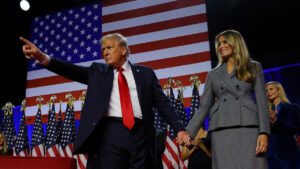By Sheldeen Joy Talavera, Reporter
INVESTORS in the energy market could be given pause by Donald J. Trump’s return to power and are watching for any shifts in energy policy, analysts said.
“Philippine and Southeast Asian investors can expect greater unpredictability in energy markets because of these major shifts in US energy policy under the incoming Trump administration, especially amid domestic and global opposition from climate change interests,” Sonny Africa, executive director at think tank IBON Foundation, said via Viber.
“The availability and cost of energy in the country and the region could be affected by how US policies can significantly sway market dynamics,” he added.
Mr. Africa said decisions made by President-elect Trump, who has “constantly questioned climate change,” will have “enormous adverse implications” on the energy transition initiatives of countries such as the Philippines.
The government is aiming to increase the share of renewable energy in the power generation mix to 35% by 2030 and to 50% by 2040.
“His aggressiveness in expanding fossil fuel use for the US to have the cheapest electricity in the world as a pillar of renewed US industrialization will be a major setback for climate efforts not just in the US but around the world,” Mr. Africa said.
While the direct impact of Trump’s win on global growth is likely to be limited next year, as policy change takes time to be implemented in the US, the uncertainty will inspire caution, Oxford Economics said in an e-mail response to BusinessWorld.
“Beyond the short term, uncertainty over the extent and magnitude of future tariffs, tighter financial conditions, and heightened geopolitical risk will lead non-US firms to adopt a more cautious approach towards investment and hiring plans,” it said.
Mr. Trump has promised to impose 60% tariffs on US imports of Chinese goods, as well as up to 20% tariffs on all imports.
Sam Reynolds, research lead at Institute for Energy Economics and Financial Analysis, said that Mr. Trump’s planned tariffs could worsen the oversupply of solar panels in Southeast Asia from China, possibly lowering costs.
“Overall, President-elect Trump’s victory — as well as Republican control of both houses of Congress — should not change the economics of the energy transition or the trajectory of clean energy technologies versus fossil fuels,” Mr. Reynolds said in an e-mail.
He said that the costs of renewable energy technologies like solar, wind, and battery storage, “continue to fall.”
Meanwhile, fossil fuels like coal and liquefied natural gas remain elevated due to “geopolitical uncertainty, seasonal price swings, supply outages, trade route disruptions,” among others.
“Although Trump’s victory may not change the long-term economic trajectory of the energy transition, there will likely be a renewed political push for fossil fuels in the Philippines and Southeast Asia, as well as depressed support for global climate efforts more broadly,” Mr. Reynolds said.
Analysts expect the Trump administration to once more withdraw the US from the Paris Agreement, as it did during his first term.
“If this happens and the US disengages from its climate commitments, his government should expect opposition from the most vulnerable regions and populations,” Gerry C. Arances, executive director at think tank Center for Energy, Ecology, and Development, said in a Viber message.
In November 2019, former Secretary of State Michael R. Pompeo said Mr. Trump made the decision to withdraw from the agreement due to the “unfair economic burden imposed on American workers, businesses, and taxpayers by US pledges made under the agreement.”
The US officially rejoined the Paris Agreement in 2021 under President Joseph R. Biden, Jr.
The Paris agreement is a global treaty that aims to keep the global temperatures rise below 2°Celsius. The Philippines is one of the signatories to the treaty.

